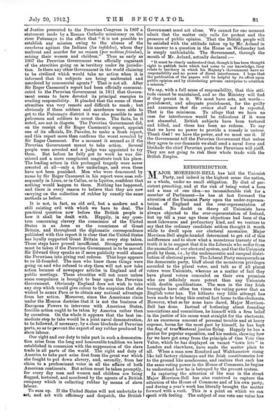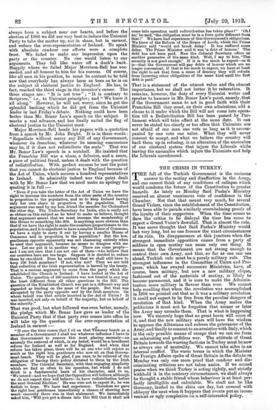REDISTRIBUTION.
MAJOR MORRISON-BELL has laid the Unionist Party, and indeed in the highest sense the nation, as a whole, under no small obligation. By dint of per- sistent preaching, and at the risk of being voted a bore and a man of one idea—no inconsiderable risk for a member of Parliament—he has at last focussed the attention of the Unionist Party upon the under-represen- tation of England and the over-representation of Ireland. No doubt in, theory all Unionists have always objected to the over-representation of Ireland, but up till a year ago these objections had been of the most lukewarm and perfunctory kind, and we venture to say that the ordinary candidate seldom thought it worth while to dwell upon our electoral anomalies. Major Morrison-Bell single-handed determined to get rid of this indifference and to show what a monstrous travesty of the truth it is to suggest that it is the Liberals who suffer from the anomalies of our electoral system, and that the Unionists profit by them, i.e , by the undemocratic and unequal distri- bution of electoral power. The Liberal Party masquerade as the democratic party, bluff about the monstrous privileges accorded to the plural voter, and talk as if all plural voters were Unionists, whereas as a matter of fact they have plural voters concealed. on their own premises who are infinitely more potent than any Unionists with double qualifications. The men in the tiny Irish boroughs have often ten times the voting power that an English voter has. Yet hitherto very little attempt has been made to bring this central fact home to the electorate. However, what so far none have dared, Major Morrison- Bell has done. Instead of bothering about founding associations and committees, he himself with a firm belief in the justice of his cause went straight for the electorate. At an enormous amount of personal trouble and at heavy expense, borne for the most part by himself, be has kept the flag of true%lectoral justice flying. Happily be has a genius for popular exposition, and his models, showing how far we have got away from the principle of One Vote One Value, which he has displayed on vacant "town lots" in London and. elsewhere, have made the matter plain to all. When a man sees Romford and Walthamstow rising like tall factory chimneys and the Irish constituencies low to the ground like mushrooms, and realizes that each has the same voting power in the House of Commons, he begins to understand how he is betrayed by the present system. In capturing the attention of the man in the street Major Morrison-Bell has also contrived to capture the attention of the House of Commons and of his own party, and during a year's work has literally brought the matter forward with a rush. This is a point on which we can speak with feeling. The subject of one vote one value has always been a subject near our hearts, and before the election of 1906 we did our vary best to induce the Unionist Party to take the matter up, not in sham, but in earnest, and reduce the over-representation of Ireland. To speak with absolute candour our efforts were a complete frost. We failed to make any impression upon the party or the country. No one would listen to our arguments. They fell like water off a duck's back. Happily where we failed Major Morrison-Bell has suc- ceeded, and all honour to him for his success. Of course, like all men in his position, he must be content to be told now that everybody has always been as keen as he is on the subject of electoral justice to England. He has, in fact, reached the third stage in the inventor's career. The three stages are : "It is not true " ; "It is contrary to Scripture," i.e., to Unionist principles ; and "We knew it all along." However, he will not worry, since he got the splendid backing which he did get from the Unionist leader in last Friday's debate. Nothing could have been better than Mr. Bonar Law's speech on the subject. It marks a real advance, and has finally nailed the flag of electoral justice to the Unionist mast.
Major Morrison-Bell heads his papers with a quotation from a speech by Mr. John Bright. It is in these words : "Repudiate without mercy any Bill of any Government, whatever its franchise, whatever its seeming concessions may be, if it does not redistribute the seats." That was Mr. Bonar Law's speech in a nutshell. He insisted that the Franchise Bill was a sham, a delusion, and a snare, a piece of political fraud, unless it dealt with the question of redistribution. With perfect success he met the point that you cannot do electoral justice to England because of the Act of Union, which secures a hundred representatives to Ireland. So admirably indeed was this point dealt with by Mr. Bonar Law that we need make no apology for quoting it in full :— "Even if you take the letter of the Act of Union we have the right to increase the numbers from the other parts of the country in proportion to the population, and so to keep Ireland having only her own share in proportion to the population. That argument was used by my hon. friend the member for Chelmsford the other day. The Under-Secretary for India, who is really not so obtuse on this subject as he tried to make us believe, thought that argument meant that we must increase the membership of this House to something like 900. Is anything more obvious than that if we have the right to make the numbers proportionate to the population, and it is expedient to have a smaller House of Commons, we have a right to carry it out by having a smaller House of Commons and in proportion to the population ? But the hon. gentleman opposite apparently was not shamming entirely when he used that argument, because he seems to disagree with me now. Let me put it in another way. There are some people— and I am not sure that I am not one of them—who believe that our numbers here are too large. Suppose it is decided to reduce them by one-third. Does he contend that we shall still have to keep 100 Irish members? If not, why not? Then we are told that reduction of the Irish representation is barred by the treaty. That is a curious argument to come from the party which dis- established the Church in Ireland. I have looked at the Act of Union. The question of 100 members was not treated in any way the least different from all other questions in the Bill. The question of the Established Church was put in a different way and regarded as binding on the mass of the people. But that was abrogated by the party opposite and by the Irish members. On whose behalf was that article inserted in the Act of Union ? It was inserted, not only on behalf of the majority, but on behalf of the minority."
That was good, but what followed was even better, namely, the pledge which Mr. Bonar Law gave as leader of the -Unionist Party that if that party ever comes into office he will take up the question of the over-representation of Ireland in earnest :- "If ever the time comes that I sit on that Treasury bench as a member of a Government I shall use whatever influence I have in that Government to remove this most glaring anomaly—an anomaly the removal of which, in my belief, would be a beneficent reform for Ireland as well as for England. And when that reform has taken place, there will be no one who will rejoice so much as the right hon. gentlemen who now sit on that Govern- ment bench. They will be glad, I am sure, to be relieved of the obligation of having their policy dictated to them by the Irish members. The Colonial Secretary, with that engaging simplicity which we find so often in his speeches, but which I do not think is a fundamental basis of his character, said to us, We intend—and we hope that the Opposition will believe, although we do not expect they will believe—to have redistribution before the next General Election.' He was wise not to expect it; he was foolish to hope. We have had experience. Therefore we gave the right hon. gentleman immediately a chance of showing how much sincerity there was in that statement. We immediately asked him, Will you put a clause into this Bill that it shall not come into operation until redistribution has taken place ? "Oh I no,' he said, the obligation must be in a form quite different from that !' We have had experience of this Government's obligations. We know of the Reform of the House of Lords, which the Prime Minister said would not brook delay.' It has suffered some delay. The Prime Minister said it was 'a debt of honour.' The debt has not been paid. Now the Colonial Secretary offers us another guarantee of the same kind. Well, I say to him, 'The security is not good enough.' If it is too much to expect—as it is—that the Government will pay debts of honour which are no longer convenient, if that is too much to expect, we have at least the right to ask that from a sense of decency they will refrain from incurring other obligations of the same kind until the first debt is paid."
That is a statement of the utmost value and the utmost importance, but we shall not better it by reiteration. It remains, however, the duty of every Unionist writer and speaker to hammer in Mr. Bonar Law's point, namely, that if the Government mean to act in good faith with their Franchise Bill they must, on their own admissions, add a clause to it under which the Bill will not come into opera- tion till a Redistribution Bill has been passed by Par- liament which will take effect at the same date. It can never be stated too clearly or too often that Unionists are not afraid of one man one vote so long as it is accom- panied by one vote one value. What they will never consent to accept, and what we believe the country will back them up in refusing, is an alteration of the anomalies of our electoral system that injure the Liberals while leaving the anomalies which injure the Unionists and help the Liberals unredressed.







































 Previous page
Previous page